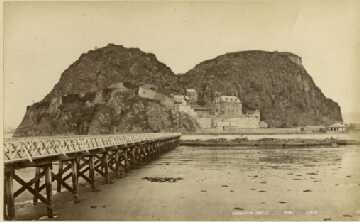Born: c400
Died: c470
Father: Cynlo[y]p (c370-c450)
Mother: ?
Spouse: ?
Children:
No pic yet ===>>

Born: c400
Father: Cynlo[y]p (c370-c450) Spouse: ?
Children: No pic yet ===>> |
 |
MBKQ p183: "[FB1 = 1rst ruler of Strathclyde, DA6 = 6th ruler of N Britain; i.e. Yorkshire to the Clyde, possibly P89 = 89th ruler in Geoffrey of Monmouth's list] Ceretic of Alclud fl c450s-70s: Ceretic is the earliest ruler we know of the territory later called Strathclyde. This had as its core the tribe of the Damnonii, and it is likely that Ceretic was of that tribe. His pedigree suggests his forebears were Roman officials who had been placed in authority over the Damnonii. His gfather is recorded as Cinhil (possibly the Roman Quintillius) the son of Cluim (or Clemens), who was probably a Roman general established in command at the Clyde during the reign of Magnus Maximus in the late 4C. It is also just possible that this Ceretic is the same as Ceredig [EB1], the son of Cunedda, and that he may not only have established a kingdom in Alclud, but subsequently joined his father in N Wales where his descendents ruled Ceredigion. [In any case] Ceretic's strict area of rule may not have extended far from his rocky fortress of Dumbarton [get pic], but his influence certainly extended far afield. He is known because St. Patrick wrote to him c450 to complain about his practice of capturing young Irish men and women and selling them as slaves to the Picts. The slave trade between Ireland and Scotland was extremely profitable (in lieu of any coinage) and it was on this wealth that the strong kingdom of Alclud was established. It is not recorded that Ceretic did anything about it. Patrick wrote a 2nd time to admonish the king. The only effect we know this had is from Muirchu's colorful account of Patrick's life in which Ceretic apparently had a premonition that his time had come and, in full view of his court, he was transformed into a fox and ran away. This may have a double-edged interpretation. Ceretic may, at length, have quailed before the wrath of Patrick and ceased his trading openly, but foxes are known for their cunning, and Ceretic may well have continued it in a more sly fashion. We will never know. He was succeeded by his sons Erbin and Cinuit."
MBKQ pp44-6: "The period between 410 and 450 [in Britain] saw an almost complete breakdown of the social order, particularly in the N. Famine and pestilence swept across Britain. By 450 Britain was in a sorry state and what remained of administration in the S appealed to the Roman consol in Gaul Agitius Aetius, for help, but none came. During this 40yrs certain chieftains had become warleaders to defend their lands ... The best known was Coel [Hen], the Old King Cole of the nursery rhyme ... Others from this period in the N were Ceretic, who ruled from Dumbarton, and Cunedda, who seems to have been a war leader in the area of the Votodini, in Lothian, before he migrated to N Wales ... Cunedda was king of the Votadini, meaning that tribe, not of the land associated with them ... The best known of the [more Romanized] S kings was Vortigern ... The period from 450 to 550 is aptly called the age of Arthur ... The [Briton] kingdoms we know are those that survived the initial Saxon invasion and were documented in the battles that followed as the Saxons and Angles drove westward. In the N there was a British kingdom based on the tribe of the Votadini, which later became known as the Gododdin. These are remembered amongst the Welsh triads and poems. One of their rulers, Leudonus, later gave his name to the N part of the territory, known to this day as Lothian. Another of their rulers, Morcant [hmmm, Arthurian Modred?], betrayed Urien [Uther?] and allowed the Angles to gain their foothold on Deira (the southernmost of these N kingdoms) and later Bryneich, or Bernicia"
MBKQ p92 i.e. section on Maximus: "The legacy of Maximus' campaign [to become RE] was to weaken an already weakening Britain. Although he did not withdraw all forces from the island, he certainly withdrew a substantial number. There is no doubt that as a seasoned campaigner he would not have left the island undefended, and this is probably where the origins of other royal families arose. It is probable that Maximus installed some strong commanders in the territory between the Hadrianic and Antonine Walls who became the forebears of later rulers. These would include Quintilius, or Cinhil, the gfather of Ceretic of Alclud, and Padarn of the Red Cloak, gfather of Cunedda. It is also possible that Maximus established the arrangement of a strong Irish leadership, under Eochaid in Demetia (SW Wales), and the colony of Britons in Armorica (Brittany) in N France"
MBKQ p112: "We can only assume that Arthur lived mostly in S Britain, while his contemporaries Ceretic, Bran and Leudonus dominated the N defence."

Also, see this Scotland tourism page on Dumbarton Castle.
Sources:
- MBKQ = The Mammoth Book of British Kings and Queens, Mike Ashley, Carroll & Graf, 1998, 824pp, own.
- DOKA = The Discovery of King Arthur, Geoffrey Ashe, Anchor (Doubleday), 1985, FHL.
- hisc = How the Irish Saved Civilization, Thomas Cahill, Doubleday, 1995, own.
- see also wiki.